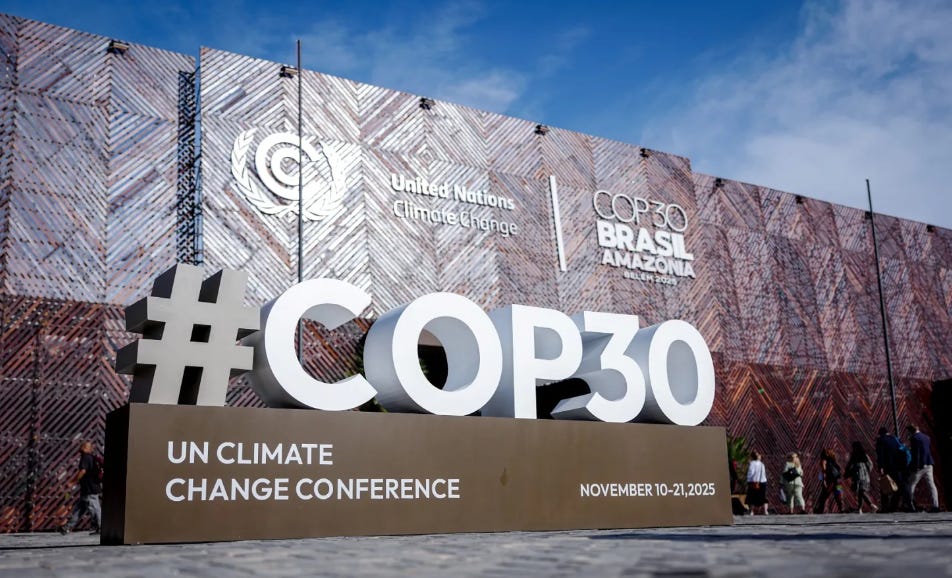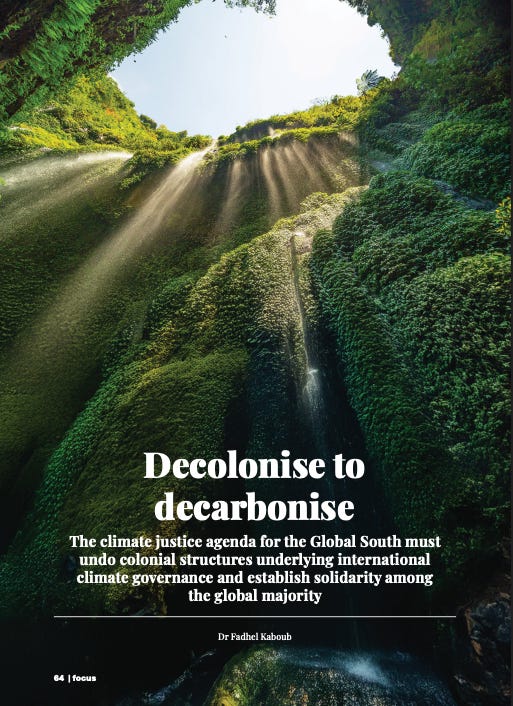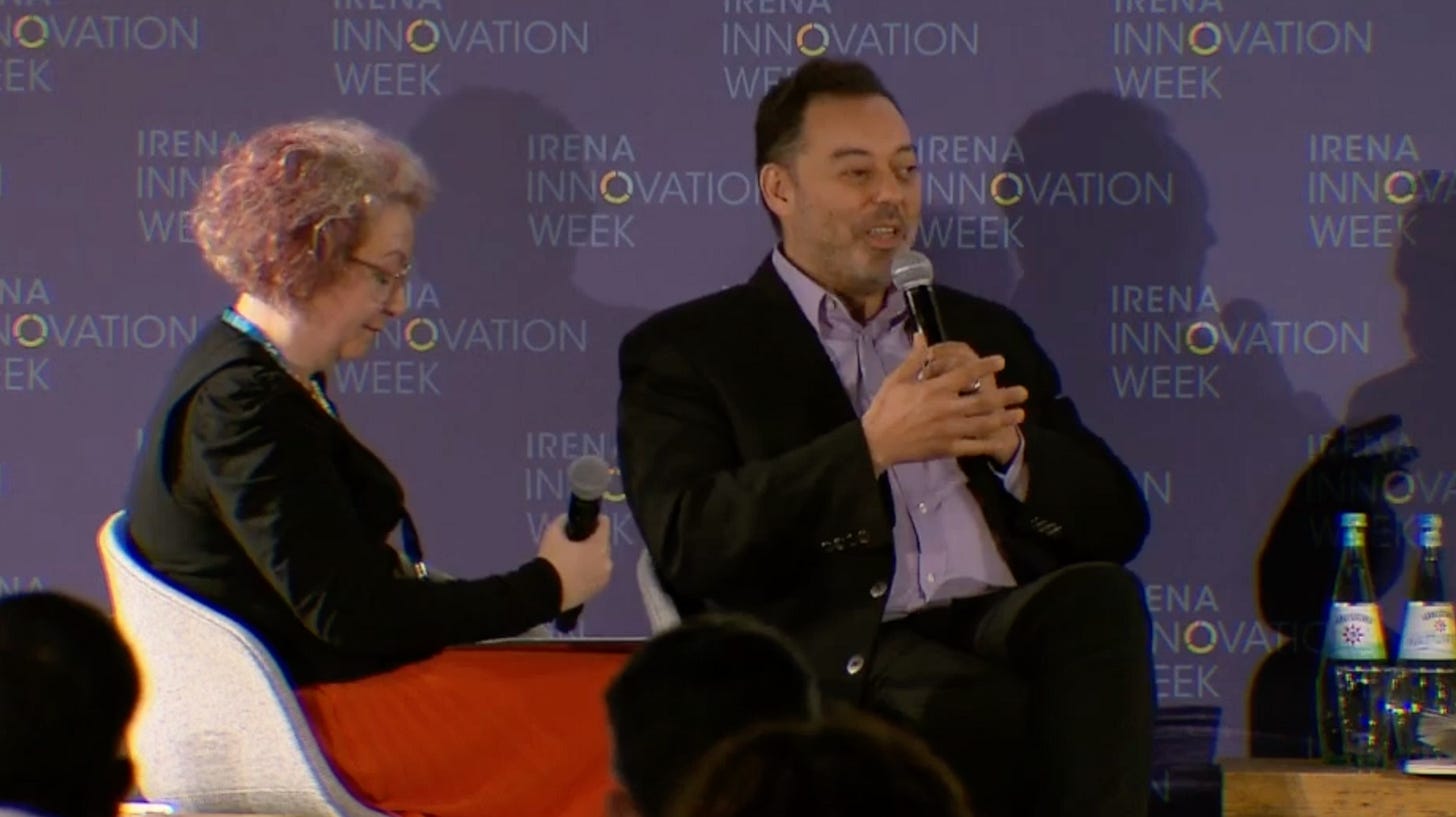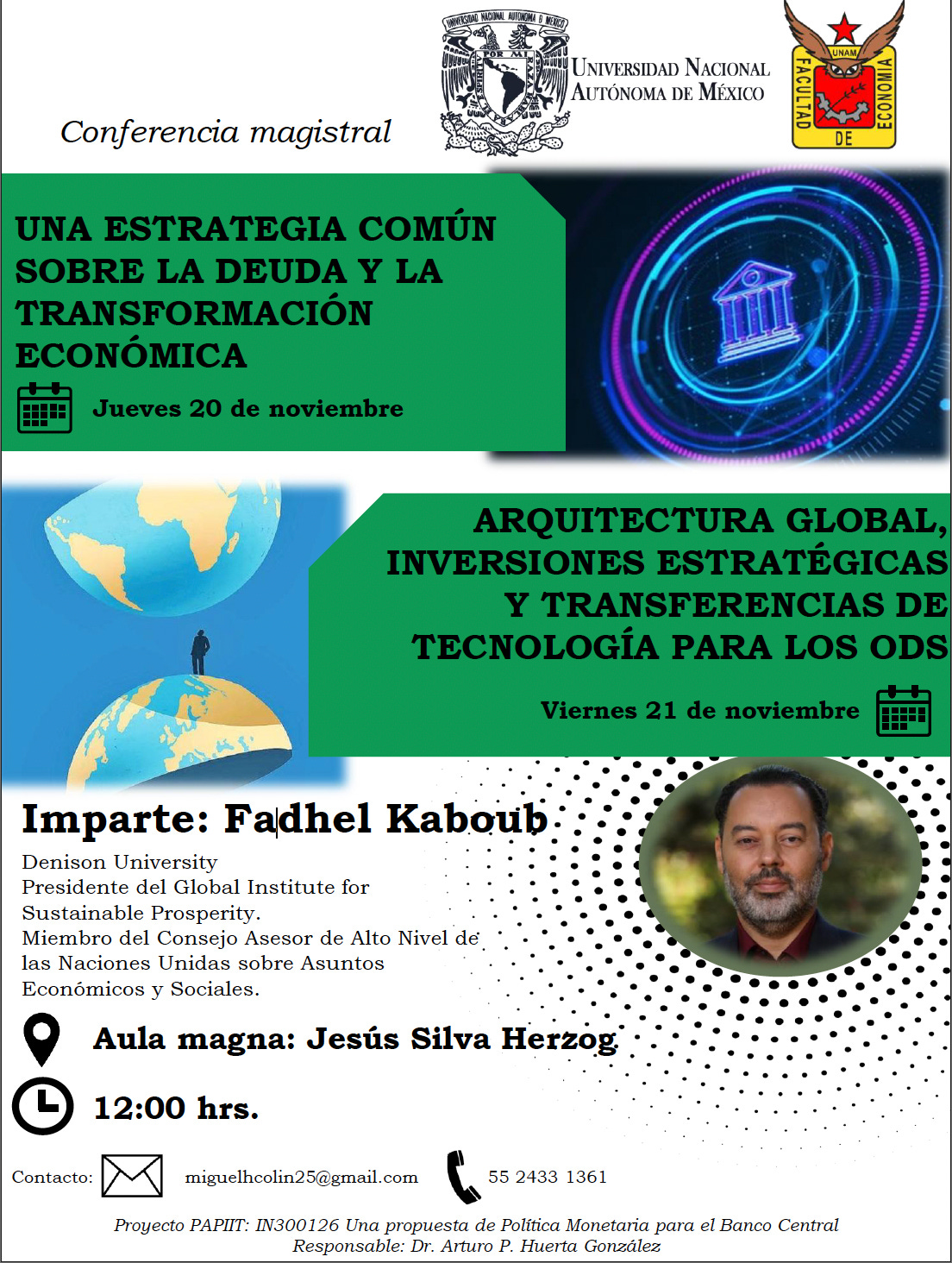At the end of COP29 in Baku last year, I described the so-called climate finance outcome as “300 Billion Lies and Economic Traps,” and I said that COP29 was not about climate finance. It was not even about climate. It was about a colonial economic and geopolitical hierarchy that refuses to be disrupted, because the kind of transformative climate finance that the Global South was asking for was going to unleash the huge development potential of the Global South, which is home to the youngest labor force in the world, the largest reserves of green transition minerals, and a massive renewable energy potential.
This week in Belem, Brazil, the host country declared that COP30 will be the COP of Truth. We will find out soon whether that will be the case, but there are already some serious concerns about the quality (not just the quantity) of climate finance. I have warned about carbon markets in the lead up to COP28 in Dubai and described carbon credits (a.k.a. pollution permits) as the most dangerous climate finance “solution.”
Today, we have a wide menu of climate finance false solutions, dangerous distractions, greenwashing neocolonial traps like carbon markets, foreign direct investment, CBAMs (carbon boarder adjustment mechanisms), low-cost labor “green industrial zones”, renewable energy extractivism, blended finance, public-private partnerships (PPPs), de-risked investments, debt for nature swaps, green bonds, etc.
We need real, transformative, just and equitable climate finance solutions that deliver grants (not loans and more economic entrapment), debt cancellation (not debt restructuring and rescheduling), and transfer of life-saving technologies to allow the Global South the manufacture and deploy the clean energy, clean transportation, and clean cooking infrastructure needed to simultaneously decarbonize and decolonize its economic system.
Share Global South Perspectives ~ by Fadhel Kaboub
Truth: The Era of Fossil Fuels is Over
The IEA’s World Energy Outlook 2025 (released on Nov. 12) confirms what many of us in the Global South have long known: the fossil-fuel era is ending, not because of political will, but because the economics of renewables is winning. This is very bad news for those who have spent hundreds of billions of dollars in the last decade building oil and gas infrastructure. My advice to pension funds, university endowments, and institutional investors is very straightforward: divest now before the carbon bubble blows up and you’ll be left with nothing but stranded assets.
For Africa, the real question is whether the continent will once again be positioned as a passive supplier of raw materials to fuel other region’s energy transitions—or whether Africans will seize this historic moment to build energy sovereignty, industrial capacity, and climate resilience on our own terms.
Halting new fossil fuel investments is a moral, ecological, and economic imperative. But it must go hand in hand with building the fiscal and technological capacity to invest massively in renewable energy infrastructure, grid modernization, and localized value chains—from solar manufacturing to battery storage capacity production. Africa cannot transition by importing clean technology while exporting its minerals unprocessed; that would reproduce the same colonial dependency under a green label.
To accelerate Africa’s just energy transition, we need a Global Green New Deal that centers Africa and the rest of the Global South: grants, concessional finance without conditionalities, technology transfers, and a coordinated regional industrial policy that links energy, food, and industrial sovereignty. The IEA’s data shows the transition is inevitable; the question is whether it will be just. For Africa, justice means not only powering our homes but also empowering our economies. My colleagues and I have written extensively about this in Just Transition: A Climate, Energy and Development Vision for Africa(2023), and two weeks ago I wrote this piece “Decolonise to Decarbonise,” which is published by the Institute for Strategic and International Studies in Malaysia.
Only 581 GW of Truth (instead of 1,122 GW)
The 2023 Global Stocktake at COP28 produced the UAE Consensus, which includes the historic commitment to transition away from fossil fuels in a just, orderly, and equitable manner. Central to this agreement are two global energy targets to be achieved by 2030:
Tripling global renewable energy capacity, and
Doubling the global average annual rate of energy efficiency improvement.
In 2024, the International Renewable Energy Agency (IRENA) was designated as the Custodian Agency responsible for tracking and reporting global progress on these two targets. In preparation for COP30, IRENA release its assessment report, “Delivering on the UAE Consensus: Tracking progress toward tripling renewable energy capacity and doubling energy efficiency by 2030.” I will highlight just a few findings here:
In 2024, the world added 581.9 GW of renewable power—the largest annual increase ever. Solar PV (+452 GW) and wind energy (+114.3 GW) accounted for the vast majority of new installations. In order to meet the tripling target of the UAE Consensus, renewable power capacity needs to grow by +1,122 GW per year between 2025–2030, but the current growth rates are insufficient to stay on track. Sadly, this growth in renewables is highly uneven: Asia, Europe, and North America account for 85.4% of total installed renewable capacity; the rest of the world only 14.6%. And more importantly, 91% of newly added renewable energy capacity delivers electricity cheaper than new fossil fuel generation. On the energy efficiency front, global energy intensity improved by 1% between 2023–2024—far below the pace needed to double efficiency, and global building renovation rate remains just 1% of building stock. The IRENA report makes it very clear that achieving renewable and efficiency goals will require massive increases in climate finance: LDCs require more than $116 billion; SIDS needs $6.1 billion, and Sub-Saharan Africa requires $113 billion to meet their Nationally Determined Contributions (NDC) energy targets.Overall, the IRENA report concludes that tripling renewables and doubling energy efficiency by 2030 remain technically achievable, but only if the annual renewable additions accelerate dramatically, energy efficiency efforts increase several-fold, infrastructure and workforce constraints are addressed, and the international system delivers substantially greater and more accessible finance. All of this is technically possible. That is the Truth, but the question is whether the political leaders at COP30 will deliver what is truly possible.
Truth: Africa is a Renewables Powerhouse
Many of you have heard me refer to IRENA’s 2021 report “The renewable energy transition in Africa: Powering access, resilience and prosperity.” Let me quote directly from the executive summary on page 5:
“Africa’s estimated potential to generate renewable energy from existing technologies is 1,000 times larger than its projected demand for electricity in 2040, which means that the continent has more than enough renewable energy potential to serve its future demand. Furthermore, renewable energy – including green hydrogen – could replace African exports of coal, oil and gas.”
And yet, Africa is still denied access to financing and to the technology to manufacture and deploy renewables at scale. This is not a design flaw; it’s a colonial design feature.
To close, let me share a brief clip of my remarks at the IRENA Innovation Week 2025 in Bonn, Germany (June 2025), in which I explain why it’s important to shift the narrative about climate finance and what needs to be done to unleash transformative climate action in the Global South. Here is the full summary report from IRENA’s Innovation Week 2025.
At that closing session, I was asked what would be my suggestion for Global South countries in preparation for COP30. Here is what I said back in June.
My tongue-in-cheek suggestion for Global South countries going to COP30 in Belem is, instead of sending hundreds of diplomats, negotiators, climate finance experts, and civil society groups, why not send a very small delegation of say ten people representing different constituencies from the Global South, headed by an elder from an indigenous community. The delegation would have a short list of climate action demands that can fit on a single piece of paper.
You can picture the scene of the Global South delegation entering a small negotiation room, sitting across the table from representatives from the historic polluters of the Global North. Imagine a scene with dramatic music playing in the background when the Global South delegation pull out a single piece of paper folded in half, give it to the elder heading the delegation who will briefly unfold it for a quick look, then fold it back and slowly slide it across the table while locking the most intense and intimidating eye contact with her counterpart across the table representing the Global North. You can imagine the rest of the scene, but the substance of the Global South demands for climate action are very straight forward:
Transfer of life-saving technologies for green joint-industrial policies in the Global South to replicate the entire value chain for manufacturing and deploying renewable energy, clean cooking, and clean public transportation infrastructure.
Cancel all climate-induced debts incurred by the Global South.
Fund the Loss & Damage Fund with a minimum of $1 trillion of grant-based financing that must be replenished continuously as a buffer to be deployed immediately after climate-induced disasters.
Provide grants (not loans) for strategic investments in regional food sovereignty and agroecology.
Stop all fossil fuel expansion plans, and rapidly phase out all existing coal, oil, and gas infrastructure under a just transition framework as suggested by the Fossil Fuel Non-Proliferation Treaty Initiative.
Stop promoting market-based false solutions and dangerous distractions such as solar geoengineering, pollution permits (a.k.a. carbon credits), and carbon capture and sequestration.
The pathway outlined above is not only climate action but is also a transformative development framework that will inevitably disrupt the existing global economic and geopolitical hierarchy in which the Global South is currently locked at the bottom of the economic hierarchy. However, what is proposed here is to use the climate crisis moment to say that we cannot decarbonize a system that hasn’t been structurally and economically decolonized yet. In other words, this is an opportunity to reposition the global majority at the center of a new multipolar international economic order of peace, justice, and sustainable prosperity for all.
Thanks for reading Global South Perspectives ~ by Fadhel Kaboub! This post is public so feel free to share it.
Don’t miss this webinar “A World in Chaos” on Sunday Nov. 16. RSVP here: https://shorturl.at/X8cyg
Join us next week in Mexico City at UNAM: November 20th and 21st, 2025.
Fadhel Kaboub is a Tunisian-American economist. He is an associate professor of economics at Denison University, and the president of the*Global Institute for Sustainable Prosperity.* He is the author of*Global South Perspectives* on substack. He is a board member of the United Nations High-Level Advisory Board on Economic and Social Affairs at UN-DESA. He is also a member of the*Independent Expert Group on Just Transition and Development, an expert group member with theGlobal Solidarity Levies Task Force, a member of theEarth4All 21st Century Transformational Economics Commission, a Steering Committee member with theFossil Fuel Non-Proliferation Treaty Initiative, and a member of the Independent Expert Group on Just Transition Finance. He has recently served as Under-Secretary-General for Financing for Development at the Organisation of Southern Cooperation in Addis Ababa, Ethiopia. Dr. Kaboub is an expert on designing public policies to enhance monetary and economic sovereignty in the Global South, build resilience, and promote equitable and sustainable prosperity. His recent work focuses on Just Transition, Climate Finance, and transforming the global trade, finance, and investment architecture. His most recent co-authored publication isJust Transition: A Climate, Energy, and Development Vision for Africa* (May 2023). He has held a number of research affiliations with the Levy Economics Institute (NY), the John F. Kennedy School of Government at Harvard University (MA), the Economic Research Forum (Cairo), Power Shift Africa (Nairobi), African Forum on Climate Change, Energy and Development (Abuja), and the Center for Strategic Studies on the Maghreb (Tunis). Dr. Kaboub is currently working on a book manuscript tentatively called The Geopolitical Bargain of the Century: Towards a New International Economic Order of Peace, Justice, and Sustainable Prosperity (forthcoming).
From Global South Perspectives ~ by Fadhel Kaboub via this RSS feed







